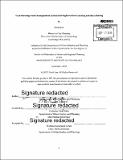Transforming waste management systems through location tracking and data sharing
Author(s)
Lee, David, Ph. D. Massachusetts Institute of Technology
DownloadFull printable version (23.41Mb)
Other Contributors
Massachusetts Institute of Technology. Department of Urban Studies and Planning.
Advisor
Carlo Ratti.
Terms of use
Metadata
Show full item recordAbstract
This dissertation investigates how location tracking technologies can transform municipal solid waste management in smart cities. While waste is often tracked in aggregate as it flows between and through handling facilities, there have been few attempts to follow individual trash items geographically using GPS and web-based mapping. Such data change the interaction between citizens, local government, and service providers, by revealing inefficiencies or fraud in disposal practices, or building trust between stakeholders and enabling alternative approaches for contracting waste services. Five essays demonstrate various designs and evaluations of real-time waste tracking systems, identify challenges and opportunities for incorporating these tools, and show how developed and developing cities can learn from each other. The first essay presents a system where individuals electronically tag a trash item, and view its movements in real-time. By surveying volunteers who participated in this experiment, it shows how this feedback can significantly improve their knowledge of how waste systems operate and where different types end up. The second essay extends this method for tracking hazardous electronic waste, such as CRT monitors, when illegally exported from high- to low-income countries. This information allows activist groups to investigate smuggling routes and support public agencies in enforcing international law. The third and fourth essays implement waste tracking in Brazil and Kenya, where many cities rely on informal workers to collect and recycle trash. By carrying smartphones tracking their location, waste pickers can map their own movements, waste generation, and material flow across the city. This allows them to organize more efficient routes, coordinate actions in real-time, and negotiate more favorable partnerships with government and private clients. Planners also benefit from crowdsourced data in informal areas. Looking to the future, the fifth essay considers how formal waste collection services could be made transparent, and how this supports crowdsourcing efforts to improve their efficiency and better meet resident needs. Doing so requires design of both real-time urban dashboards and citizen feedback mobile applications. The result transforms how cities benchmark effective municipal services and strive for high quality urban environments.
Description
Thesis: Ph. D. in Urban and Regional Planning, Massachusetts Institute of Technology, Department of Urban Studies and Planning, 2015. Cataloged from PDF version of thesis. Includes bibliographical references.
Date issued
2015Department
Massachusetts Institute of Technology. Department of Urban Studies and PlanningPublisher
Massachusetts Institute of Technology
Keywords
Urban Studies and Planning.